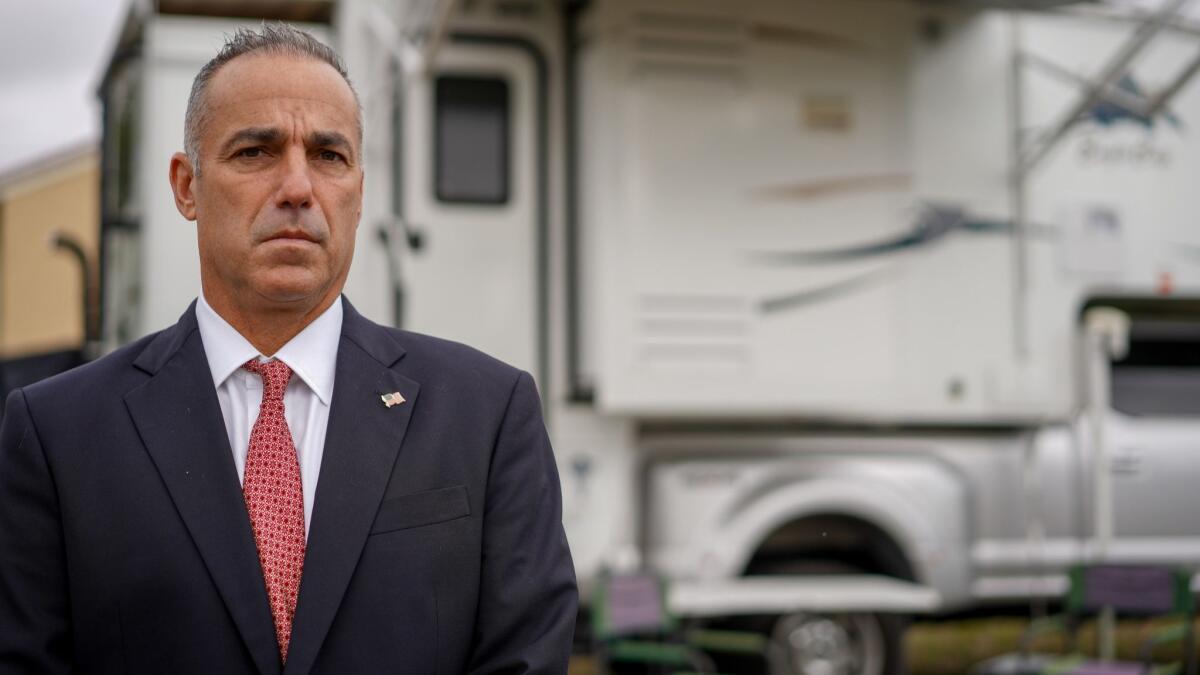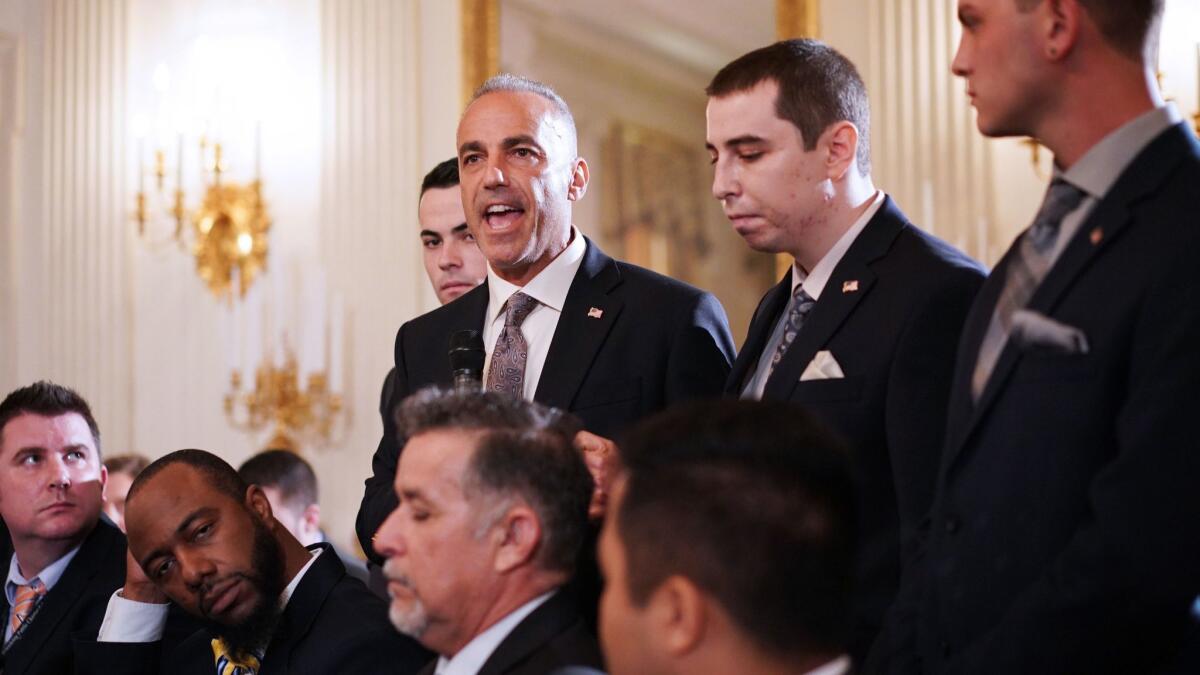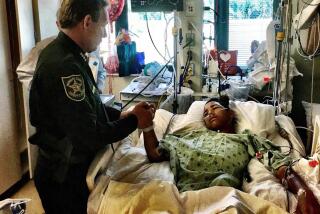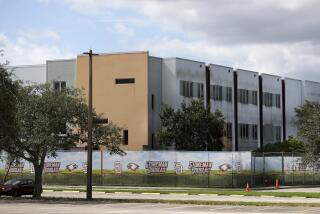Must Reads: A year after the Parkland massacre, two fathers are divided on guns but united by pain

- Share via
Reporting from Broward County, Fla. — Andrew Pollack had just settled into a folding chair in a palm-shaded campground when gunfire rang out from a nearby target range. He did not flinch.
It had been nearly a year since his 18-year-old daughter, Meadow, was shot to death with 16 other people at Marjory Stoneman Douglas High School in Parkland, Fla.
“I don’t think about guns too much,” said Pollack, whose daughter was hit by nine bullets. “It’s too easy to say it’s the gun. If it was the gun, I’d say it was the gun. But when you dig into it … there were so many failures.”
Fred Guttenberg also lost a daughter in the massacre — 14-year-old Jaime, who was shot in the back as she raced toward a stairwell entrance on the third floor. He has made it his mission to destroy the National Rifle Assn. and push for gun reform.
“The problem is you can go to any school in the U.S.A. today and a killer can get through if they really want, or they can wait outside,” he said. “If somebody wants to kill a schoolkid, they can do it. That’s why I deal with guns.”
Who they were: The victims of the Parkland school shooting »
The slaughter in Parkland last Feb. 14 — one of the deadliest school shootings in U.S. history — famously launched the March for Our Lives movement of students in favor of gun control. But a year later there is little consensus among the parents who lost children on how to prevent the next school massacre.
The two fathers — Pollack and Guttenberg, both Long Island, N.Y., natives in their early 50s, both committed to holding officials accountable for the killings and making schools safer — have very different beliefs about what should be done.
An unabashed conservative
After the massacre, Pollack was furious as he watched TV news coverage. An unabashed conservative who voted for Donald Trump in 2016, Pollack was enraged by the media’s focus on gun control.
How, he wanted to know, did the gunman get into the school? Why was he not on anyone’s radar? Where was the school resource officer?
“I’m just looking at it and I know there’s more to the story,” said Pollack, who owns and manages rental properties. “I’m like, ‘Why is everyone just focusing on gun control when I know there are multiple failures that happened?’”
A week after the shooting, he met Trump.

“I’m pissed,” he shouted in a packed listening session at the White House. “It’s not about gun laws right now. That’s another fight, another battle. Let’s fix the schools and then you guys can battle it out.”
Still, Pollack played a key role in persuading Florida lawmakers to pass a landmark school-safety bill that raised the minimum age to purchase a firearm from 18 to 21, instituted a three-day waiting period for most gun purchases and banned the sale or possession of rapid-fire devices known as bump stocks.
“In life, you have to give to get,” he said, noting that the bill also fortified schools, boosted mental health services and required schools to have a threat assessment team. It also established a contentious “guardian” program to allow some school employees to bring firearms on campus after 132 hours of firearms training.
Pollack is enraged about the pro-gun-control student activists.
“They just got famous off the death of these kids,” he said. “Their agenda was to get famous and spew more of their liberalism ways without looking at the facts.”
His belief that gun control was a misguided policy only became stronger as details began to emerge about how the gunman managed to enter the school.
An unarmed security monitor first spotted the killer — a 19-year-old former student named Nikolas Cruz — entering the campus with a duffel bag, but failed to confront him or issue a “Code Red” alert that would have triggered a campus lockdown.
Another security monitor hid in a janitor’s closet. The only armed law enforcement officer on campus reported shots from inside the 1200 building but stood outside and took cover behind a column.
Law enforcement officers did not enter until 11 minutes after Cruz had fired his first shot.
“Eleven minutes!” said Pollack. “That’s why I don’t blame guns. In that time, the killer could have had any kind of weapon in there — an ax, a knife, a musket!”
Two days after the shooting, the Federal Bureau of Investigation announced that it had failed to act on a Jan. 5 tip that Cruz had guns and had demonstrated a “desire to kill people, erratic behavior, and disturbing social media posts.”
A state panel tasked with investigating the massacre published a 439-page report last month that found that Cruz had displayed behavioral problems from an early age and that numerous opportunities to get him help had been missed.
Mother of Parkland shooting victim turns her grief into a fight for change »
At 3, he was asked to leave a preschool program after kicking and biting. In middle school, he was so unruly that staff had to escort him around campus. In high school, he used racial slurs, drew a swastika on his backpack, carried a dead squirrel in his lunchbox, spoke of drinking gasoline and threatened to shoot up the school.
Cruz was treated for depression and attention deficit disorder, but the state panel noted he was never diagnosed with a “serious mental illness” or committed to a psychiatric facility.
He had no criminal record, even though sheriff’s deputies were called to his home 21 times to deal with complaints about him. He allegedly shot a neighbor’s chickens with a pellet gun, posted online photos posing with a gun and made online threats to carry out a school shooting.
“Who should I be angry with first?” said Pollack, who has co-written a book: “Why Meadow Died: The People and Policies That Created Parkland’s Shooter and Endanger America’s Students.”
Pollack believes that a “culture of leniency” has pervaded the Broward County school district at least since 2013, when it instituted a program that discourages suspensions, expulsions and arrests in favor of counseling, conflict resolution and mentoring for students who commit certain nonviolent infractions at school.
As a result, he said, students have been allowed to get away with disruptive and even criminal behavior.
Ultimately, Pollack wants to secure schools by making everybody pass through a single, secure entrance and metal detectors. He also wants schools to improve safety training for staff and mental healthcare.
“You could go over a hundred ‘what if’s,’ ” he said. “Everything had to work perfectly and everyone had to be incompetent for my daughter to get murdered.”
In support of gun control
Guttenberg was also livid over the initial news broadcasts about the massacre.
A registered Democrat who does not own a gun, he struggled to understand why Trump and other politicians talked of securing schools and improving mental health treatment without addressing a key fact: The killer had access to a rapid-fire weapon.
“They were unable actually to even use the word gun!” he recalled.
At a vigil the night after the shooting, Guttenberg pumped his fists up and down. “I … I don’t know what I do next,” he said. “My wife is at home. We are broken. But I can tell you: Don’t tell me there’s no such thing as gun violence!”
A week later, at a CNN town hall meeting, the former Dunkin’ Donuts franchise owner confronted U.S. Sen. Marco Rubio.
“So you and I are now eye to eye,” Guttenberg told him. “Look at me and tell me guns were the factor in the hunting of our kids in this school this week! Look at me and tell me ... you will work with us to do something about guns!”
Guttenberg does not dismiss the mistakes made by local and federal officials.
He was picking out a casket for Jaime when an FBI agent called to notify him of the agency’s failure to act on a tip about Cruz. In addition to lawsuits he filed against the companies that manufactured Cruz’s AR-15-style rifle and sold it to him, Guttenberg is also suing the FBI for negligence.
“Anyone who played a role in the fact that I don’t get to watch my daughter dance anymore — that I don’t get to teach her to drive, that I don’t get to watch her grow up with her brother — should consider themselves served,” he said.
Guttenberg also supports most of Pollack’s efforts to make schools safer.
But he thinks it makes more sense for America to regulate access to guns than to fortify every school, temple, church, mall and park. “We’ll have to have armed guards on every street corner soon,” he said.
He pushes back against the idea propagated by some gun-rights advocates that the outcome at Parkland would have been the same no matter the weapon.
“Any other type of weapon, this guy doesn’t even get halfway down the first floor,” Guttenberg said. “It’s a nonsense argument, the gun lobby argument, and I reject it completely.”
He wants to tighten gun laws across the country: Raise the minimum age to buy guns to 21, add a waiting period before gun sales, require background checks on guns and ammunition, and block sales of high-capacity ammunition magazines and bump stocks.
Though he would also like to restrict access to semiautomatic weapons, he recognizes the political reality that only about 40% of Americans support making it illegal to manufacture, sell or own semiautomatic weapons.
“There’s other ways to ensure gun safety and bring people together on the issue,” Guttenberg said. “When you get to banning, people run left and right.”
A shared, unending pain
As the anniversary of the massacre neared, Pollack said he had no interest in marking it.
“Every day is Feb. 14 to me,” he said.
He and his wife, Julie, sold their sprawling five-bedroom house with the intention of speeding up plans to retire outside Florida — to somewhere more rural and more conservative. But they remain in the area for now, living in their tiny camper while Pollack continues his work to make schools safer.
Unshaven, he wore sweatpants and a Carhartt jacket with a gold pin of an angel below the lapel — a gift in memory of Meadow.
He no longer works out at the gym or plays lacrosse. He rarely smiles. He doesn’t pray like he used to.
“I’m a walking dead man,” he says flatly. “I feel bad for my wife that she’s even gotta be with me…. She got the short end of the stick.”
Guttenberg feels broken, too. But he credits the Parkland community with helping him feel a little less so.
Still, it hurts to watch Jaime’s friends grow up and become sophomores. As other parents planned Sweet Sixteens, he and his wife, Jennifer, planned the unveiling of Jaime’s headstone.
“People say give it time,” he said. “The further away, it actually gets harder.”
He now works full time on changing gun laws.
Eventually, Guttenberg plans to move, too. Somewhere he can drive to the local supermarket without passing the studio where Jaime learned to dance.
“We’re not going too far,” he said gently, as if reassuring himself. “My daughter is buried here.”
@jennyjarvie
More to Read
Sign up for Essential California
The most important California stories and recommendations in your inbox every morning.
You may occasionally receive promotional content from the Los Angeles Times.











